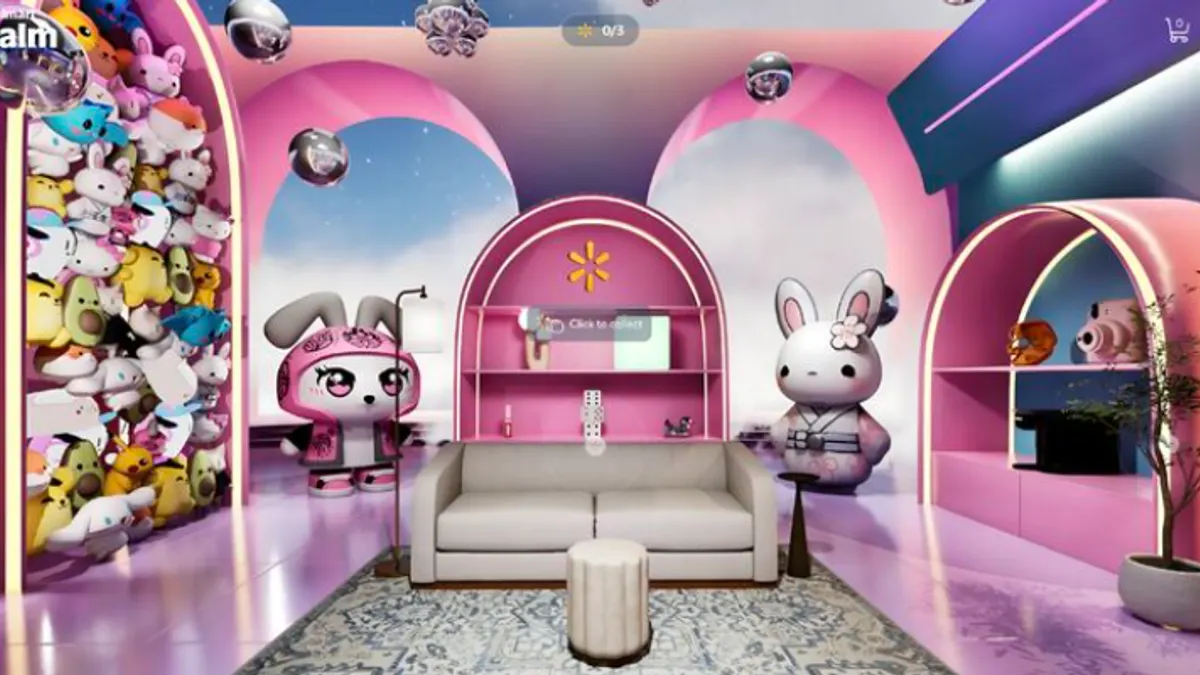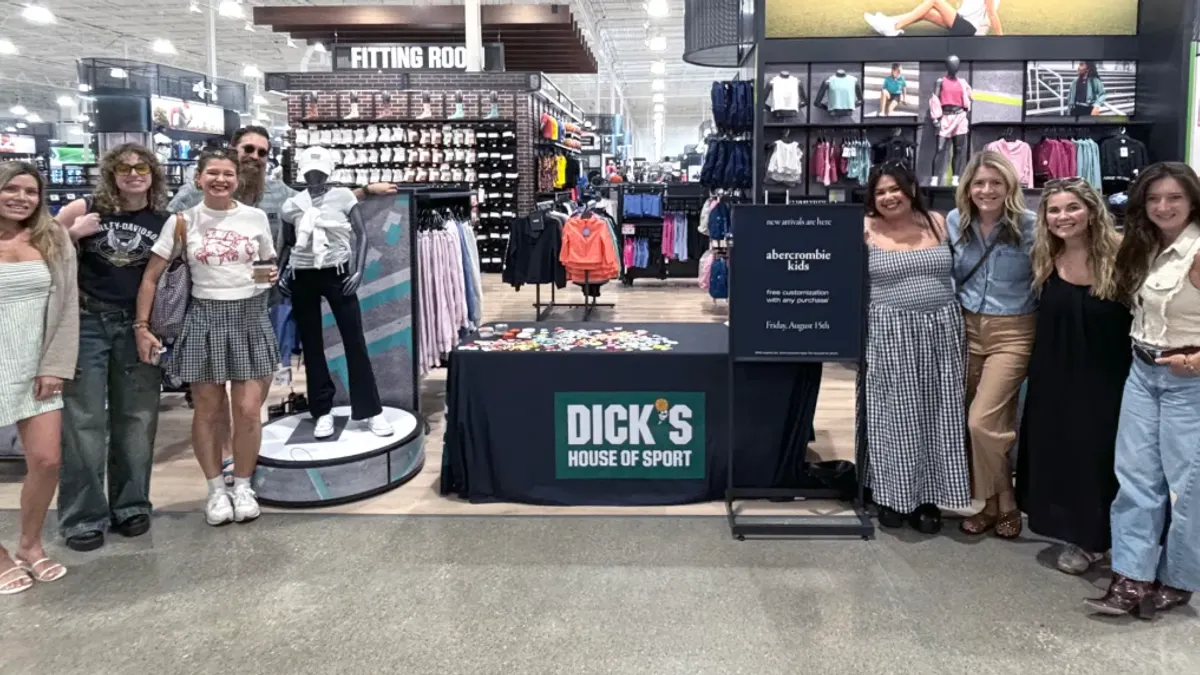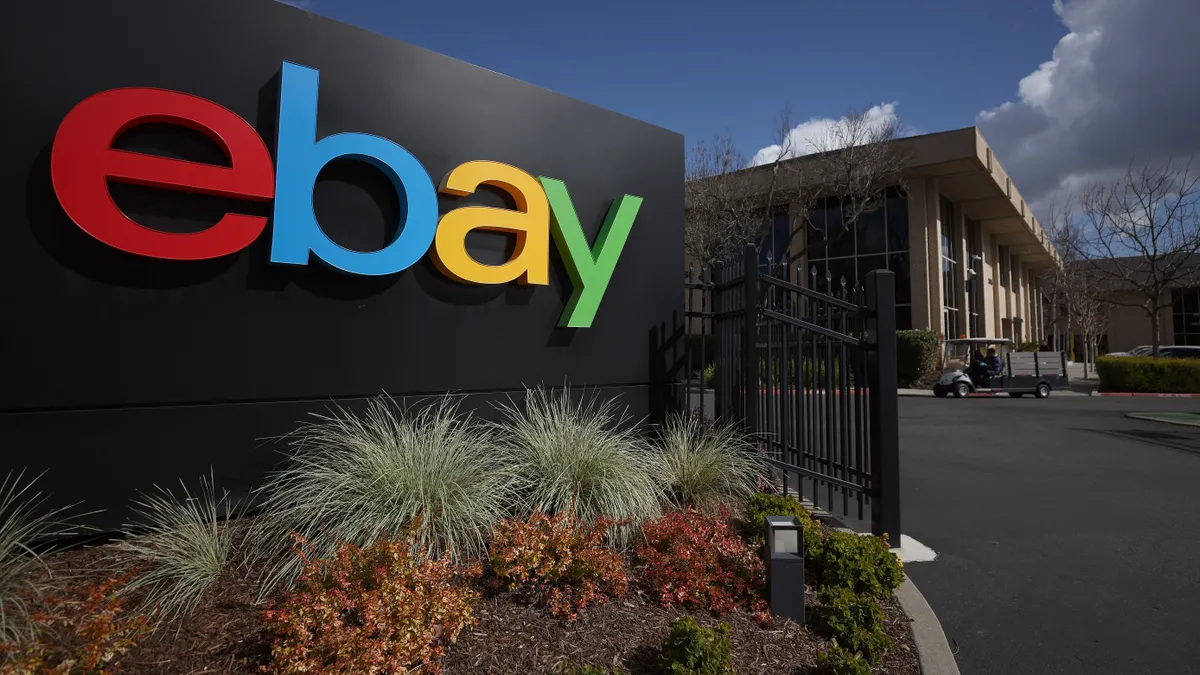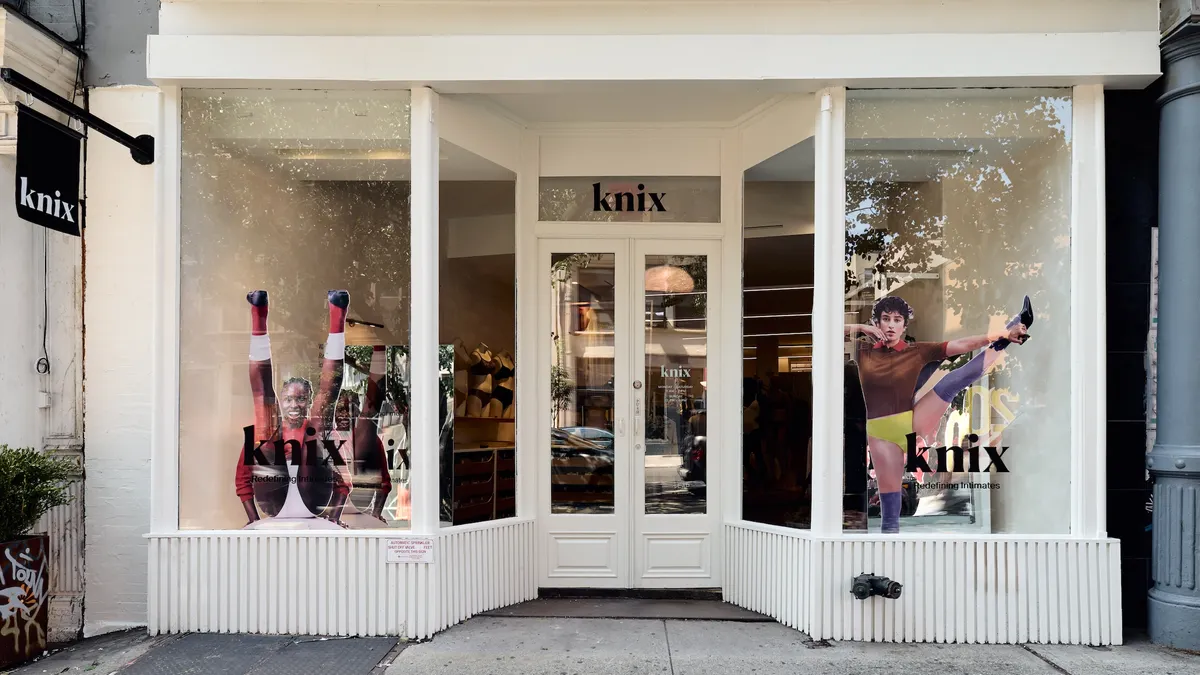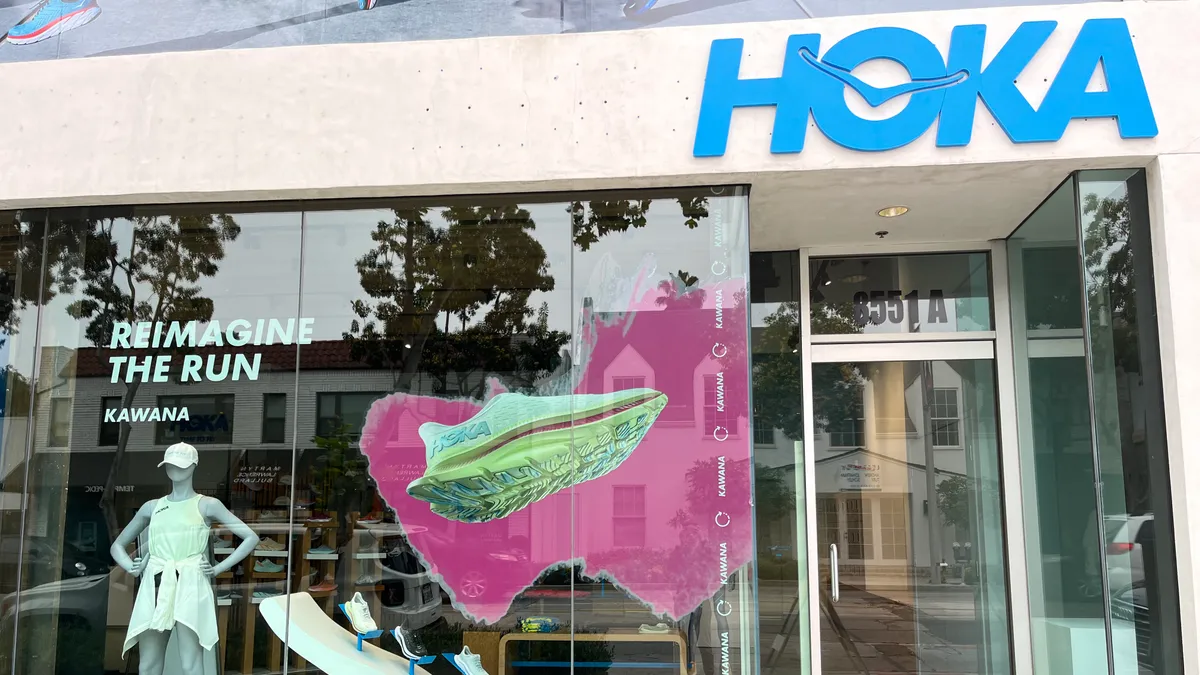The following article is part of the "30 minutes" series, where Retail Dive talks to top executives about some of retail's hottest topics. For more, check out our landing page.

Andy Prochazka
Co-founder and Chief Marketing Officer of ArticleTenure
2011-Present
Experience
Prochazka co-founded Article in 2011 and has been CMO since 2017. Prochazka is also the co-founder and director of GoodMorning.com. He served as CEO of Rehabtronics from 2005 to 2015 and currently serves on the board.

Duncan Blair
Director of Marketing at ArticleTenure
2016-Present
Experience
Prior to joining Article, Blair was head of strategy and marketing at Invoke and has also held roles as director of marketing at Wishpond, and as head of brand and communications at Orcon.
Best Buy was originally called Sound of Music. Nike used to be Blue Ribbon Sports. Retail's history is full of companies changing their minds halfway through — or, in the case of direct to consumer (DTC) furniture brand Article — unknowingly running into trademark infringement.
CMO and co-founder of Article, Andy Prochazka, said the Vancouver-based company had originally settled on the name Bryght, but ran into trouble with another furniture company, Bright, once the business started to gain steam. As to how the company settled on Article (which incidentally makes searching for the business online quite difficult), it was a story of perseverance more than anything.
"You think of one thing, you like it, someone else has it. You think of something else, you like it, then you proceed with it and then suddenly you don't like it anymore," Prochazka said in an interview. "We must have gone through thousands of names. Why did we end up with Article? I think it boils down to the fact that we all liked it."
On a basic level, it was short and memorable, Director of Marketing Duncan Blair told Retail Dive in an email, but it also reflected something of the high-quality product Article wanted to put on the market.
"We might have been imagining things, but to us the word 'article,' when used to describe an object, reflects a certain amount of reverence for that thing," Blair said. "An article is something you put thought into selecting, that you cherish and take pride in ownership of."
Since landing on Article, the company has embraced it wholeheartedly, referring to team members as "particles" and naming its company blog "Articulate." It's a trait that seems to carry through to whatever decisions Article settles on, which range from developing its own delivery team to remaining focused on a brand story about simple, high-quality and curated furniture.
"This isn't a product that you get to fill a hole, and you know it's going to last for a year and beyond that is bonus territory," Blair said in an interview, highlighting that the company's furniture — and its relationships with customers — are built to last. "We want these people to come back ... We want to see them again in 10 years."
Couch surfing
Article is predicated on a very simple thesis: People want their homes to look nice, but they don't always know how to do that. The value proposition Article offers essentially is that consumers can shop for an entire room with one brand and rest assured everything will look good together.
"It's about a curated collection of stuff that works together stylistically and aesthetically," Blair said. He explained that the purpose of Article is to make it easy for shoppers to decorate their homes fashionably, but was quick to specify that simplicity is not the same thing as convenience, which is more Amazon or Walmart's play.
"Convenient is, 'We've got 10,000 or 100,000 sofas to choose from. You'll find your perfect one. You can't lose' — but you have to wade through all of these things," Blair said. Article, on the other hand, has "give or take, 30 sofa styles and a bunch of different fabrics and things, but you don't have to do the mental gymnastics to get what you want."
The company technically has four different styles, but Blair noted that they're all meant to work together, so that someone could shop across styles and still come out with a cohesive room layout.
Article's ethos of simplicity extends to manufacturing and logistics as well. Like mattresses, furniture is often expensive and not always a pleasant experience to shop for, and DTC companies have swooped in to try and capitalize on some of those issues in the space. For Article, part of the impetus was the discrepancy between the cost to build a product and the cost it would later sell for.
"It just cascades down this chain. So unlike mattresses, there is no single party that's making a huge amount of money. It's a lot of inefficiencies."

Andy Prochazka
Co-founder and CMO of Article
Unlike mattress sellers, which were at times collecting margins as high as 900% on their products, Prochazka believes the majority of the high price tag in furniture comes from inefficiencies in the manufacturing and logistics process.
"It gets handled by so many people along the factory floor to the living room floor," he said. "So many people touch it and and it goes through different warehouses and cross-docking and storage, and because it's inherently expensive to keep a strong inventory position of these particular items, retailers don't want to do it. So they backlog all of that inventory management on the others who charge premium for it. It just cascades down this chain. So unlike mattresses, there is no single party that's making a huge amount of money. It's a lot of inefficiencies."
Some retailers are better (or perhaps just more dedicated) than others at tackling those inefficiencies. Both Blair and Prochazka praised Ikea, with the latter calling it a "magnificent example" of how to address customer needs efficiently.
"Their supply chain management and the infrastructure they built up in their approach to supply chain, their approach to retail — like that whole massive store concept with all the vignettes and that walk-through experience — I hate to say it, but I love it too," Prochazka said.
But a strong respect for Ikea hasn't made Article want to copy the Swedish furniture retailer. They serve different segments of the market, for one thing, and Blair also noted that Article's customers aren't interested in complex furniture assembly.
So, with forebears like Ikea to learn from, but no one's example to copy, Article set off carving its own path to an efficient furniture business, even when that meant developing an in-house delivery team.
Untraditional choices
Article launched its delivery service, Article Delivery Team, in New York and Los Angeles in January. The team is now operational in five major markets, according to Blair, and is responsible for more than 40% of the brand's total delivery volume. In New York, Prochazka said some 95% of deliveries are completed by Article's in-house team.
While cost efficiencies have been a "happy side-benefit" of the program, the real reason for it was tied to ensuring a consistent customer experience, Blair said. This can become harder with third-party delivery companies, which are often incentivized to fit as many delivery runs into one day as possible.
"Consistently the biggest area of frustration and also the biggest area of delight was delivery," Blair said of the customer feedback Article has received over the years. "You could have a really amazing experience and it really reinforced the decision you've made to get this beautiful sofa and you're super excited about it, or it kind of detracted from it. We simply found that getting consistency with third-party delivery providers wasn't super straightforward. Their incentives weren't perfectly aligned with ours."
Creating a consistent delivery experience has so far paid off, in more ways than one. In the markets where Article's delivery team is operating, the costs of in-house delivery are either on-par or lower than using a third party, and customer complaints are also down around 80%, Blair said. "Not to mention having roving billboards driving around New York and LA and Seattle and Vancouver," he added.
The untraditional decision to launch an in-house delivery team is matched by Article's increasingly untraditional decision not to launch physical stores. While it's become commonplace for a brand to make its start online, and grow reasonably well there, many digitally native brands are now experimenting with pop-ups or partnerships, or opening their own brick-and-mortar stores, often in the same areas.
"How much does sitting on a sofa in a made-up vignette really tell you about that product that we can't communicate in a different or essentially better ways online?"

Duncan Blair
Director of Marketing at Article
Article, however, hasn't found "a compelling reason" to open stores yet, Blair said. In order to make it worthwhile, the team would want to produce a better experience than traditional furniture shopping or see significant cost savings from building out the stores, which hasn't happened yet.
"How much does sitting on a sofa in a made-up vignette really tell you about that product that we can't communicate in a different or essentially better ways online?" Blair said.
Instead, the team has built up a large photography and videography team to try and answer the questions customers would usually turn to stores for, like testing the look and feel of a product.
Both Blair and Prochazka acknowledged that customers have asked for stores, but they stressed the importance of getting to the root of the problem rather than opening up locations just to have stores. Prochazka also highlighted the breadth of issues that come up when deciding to move into brick-and-mortar retail, from geography to store layout to the purpose of the store.
"The conversation is always — it's a bit circular," Prochazka said. "We start with, 'This is what we're trying to accomplish' and then we start going into the implementation details. We have this sort of instinct to get into the actual problem solving, and then we start talking about, you know, 'Where are our customers?' We even looked at some locations just hypothetically. And then we come back to 'Well, is this the best way we can service the need?'"
No 'forever' decisions
While stores aren't in the brand's immediate plans, Article hasn't made a "forever decision" on it, or many other things, according to Blair. For the time being, the brand's priorities are targeted elsewhere — into category expansion and additional services Article can offer to become even more valuable to its customers.
For one thing, the four styles (mid-century, Scandinavian, Industrial and Boho modern designs) Article operates off of aren't set in stone. More looks are certainly coming down the pipeline as the business evolves, with one important caveat: that Article's full collection still works together. As important as individual style is to the consumer, Article's main value proposition is making the shopping experience easy.
"We want you to be able to confidently shop the catalog and know that you're not really going to go wrong if you put things together from the catalog," Blair said.
To that end, the company is also looking into category expansion. It's the same strategy that has caused Allbirds to start selling socks, and Casper to expand into smart nightlights and CBD sleep gummies. While the end goal is still to have a curated selection of items sold through Article, there's white space in adjacent categories, or in parts of Article's business that haven't been fully built out yet.
In addition to building out the right product assortment, Article is focused on what other services the brand can bring to customers, especially ones that build upon its core message of simplicity. One thing that could be coming down the line: a more formal consultation service to help customers plan out their living spaces.
"I think there's an element of being a challenger brand in that space that enables you because the upside is so huge and the risk is so low."

Duncan Blair
Director of Marketing at Article
Like Ikea's planning studio, which focuses on helping consumers design their space (and buy the appropriate storage solutions, of course), Blair sees part of Article's future as taking a bigger role in planning. He said the company already does this to some extent, but it hasn't become a formal service yet — and there's plenty of opportunity there.
"Most people are confident enough to say, 'I like this sofa' or 'I don't like this sofa' — that's fine. It's figuring out, 'I like this sofa and I like this chair. Do they work together? Does green and blue work? I've got pink walls' — answering all those questions," Blair said. "That's where we see the next evolution of what we're doing in the business and that's one of the big problem areas we're working on."
Like some other spaces in retail, then, furniture still has a variety of problems to solve. And many of them are being taken care of by DTC brands. Some startups are tackling furniture rental, while others — like Article — are trying to cut out some of the middlemen. The home space has been a popular one for DTC brands, but rather than worry about what everyone else is trying to do, Blair says they're focused on taking share from the big players.
"I'd happily go talk to the guys at Burrow or whatever because honestly, from the outside it looks like we're directly competitive, but both of us are winning way more market share from incumbents than we're ever going to win from each other," he said, though Blair and Prochazka both noted that the company's Canadian headquarters isolates them slightly from the rest of the direct-to-consumer world.
That openness between DTC brands, even ones operating in the same space, is possible for the most part because of how small they are. When it comes to larger competitors, though brands might partner with them, the level of collaboration isn't the same.
"I'm sure the folks at West Elm wouldn't be stoked if I picked up the phone and said, 'Hey guys, want to talk about some stuff?'" Blair joked. "I think there's an element of being a challenger brand in that space that enables you because the upside is so huge and the risk is so low at that point for what you stand to lose that it's in your best interest to share with others, even if they are ostensibly directly competitive."
Correction: A prior version of this article misstated the number of markets Article's delivery team operates in. It operates in five markets.









